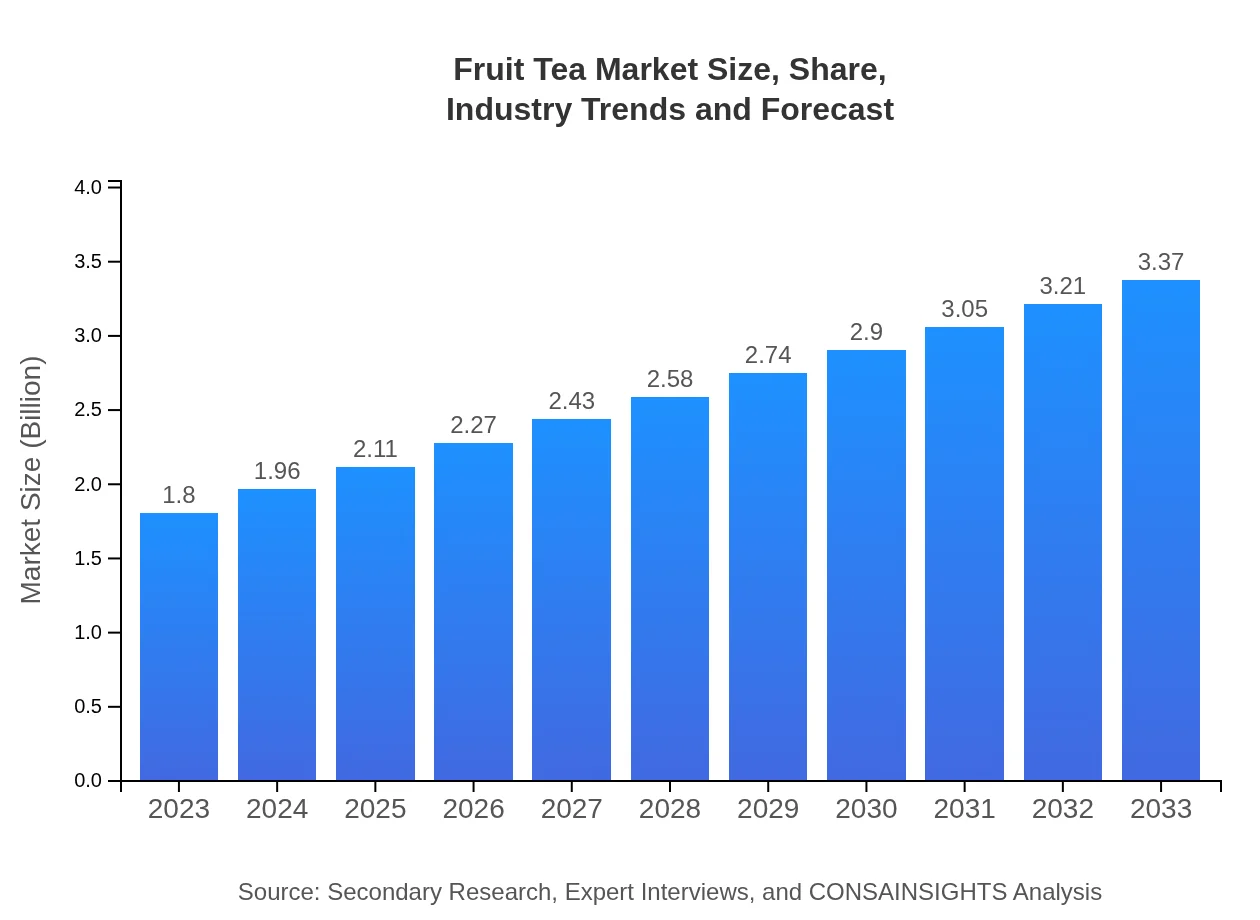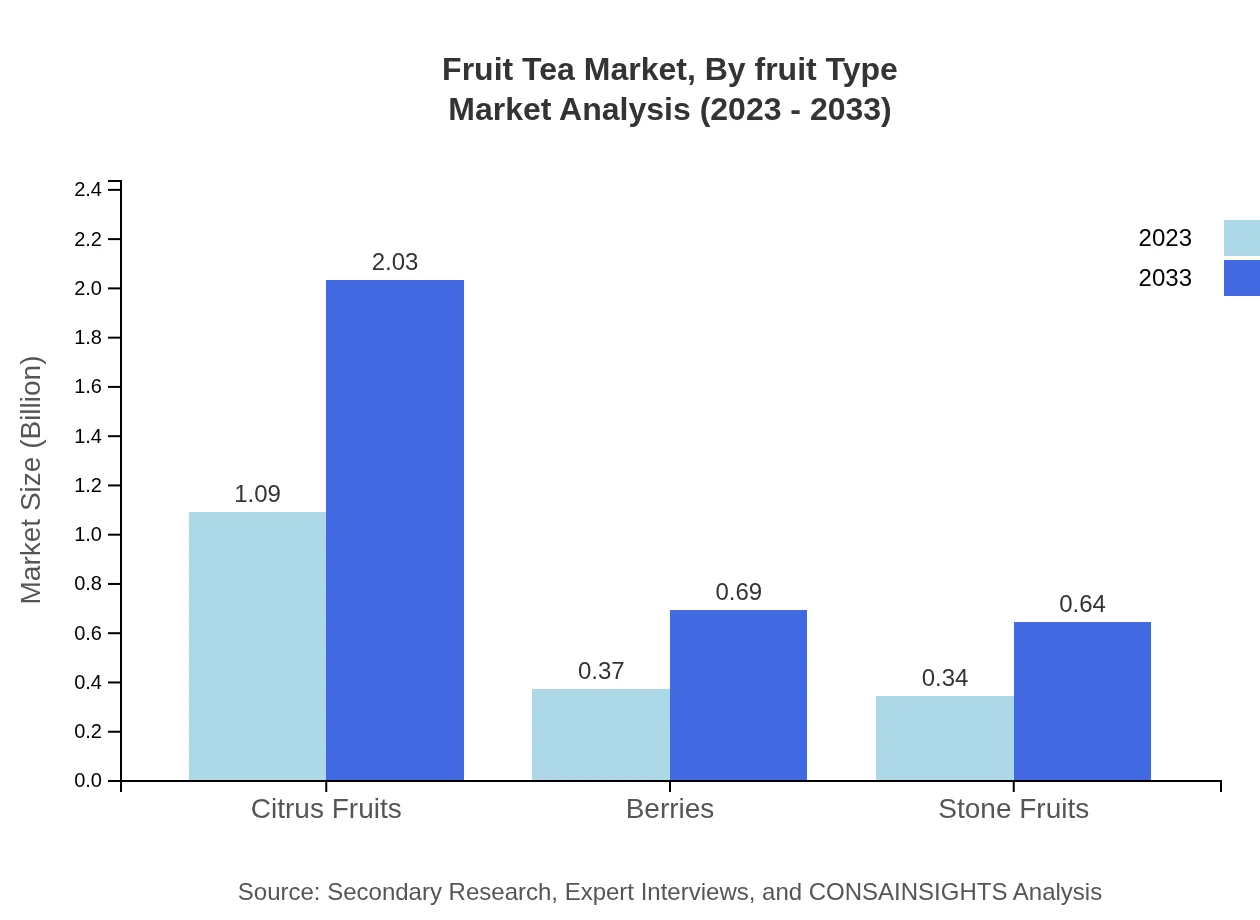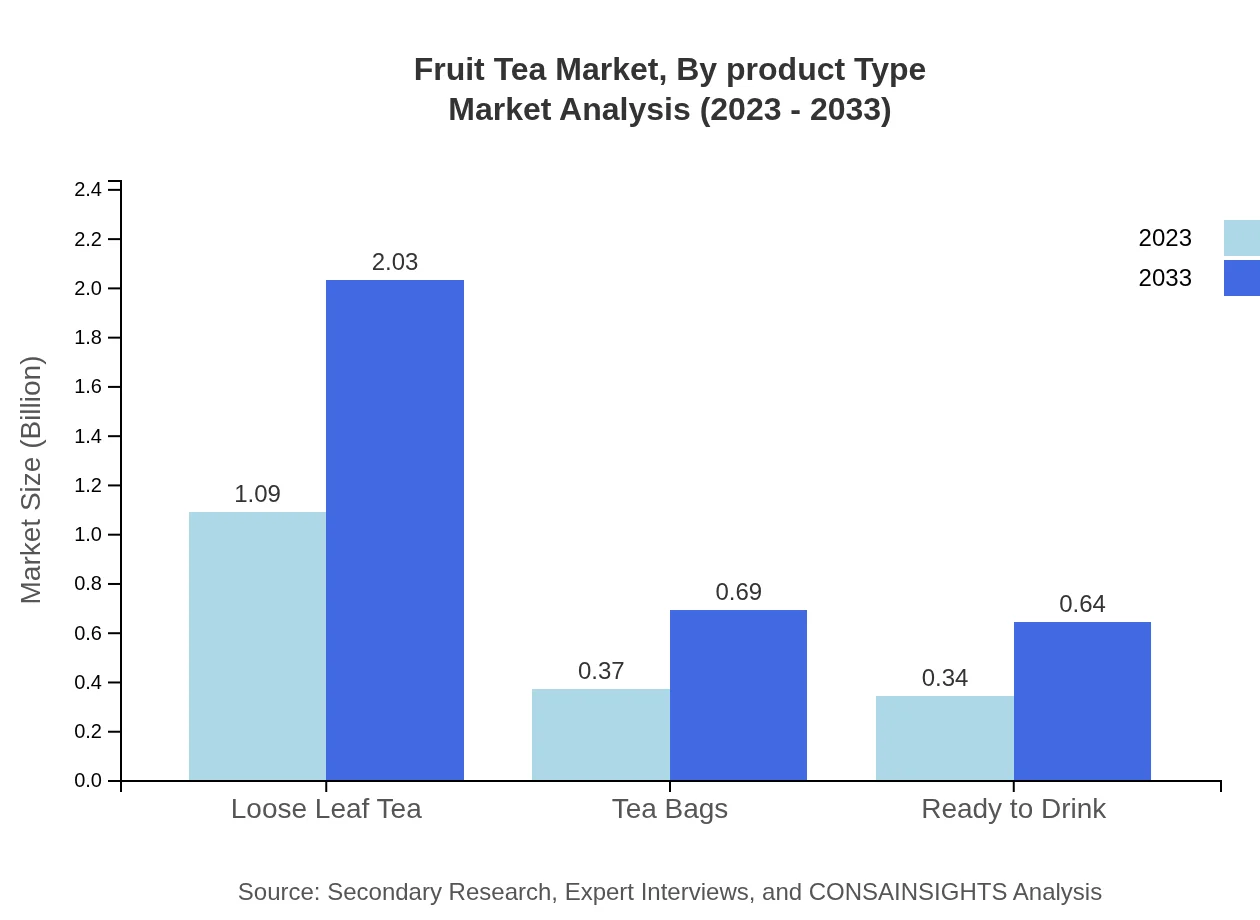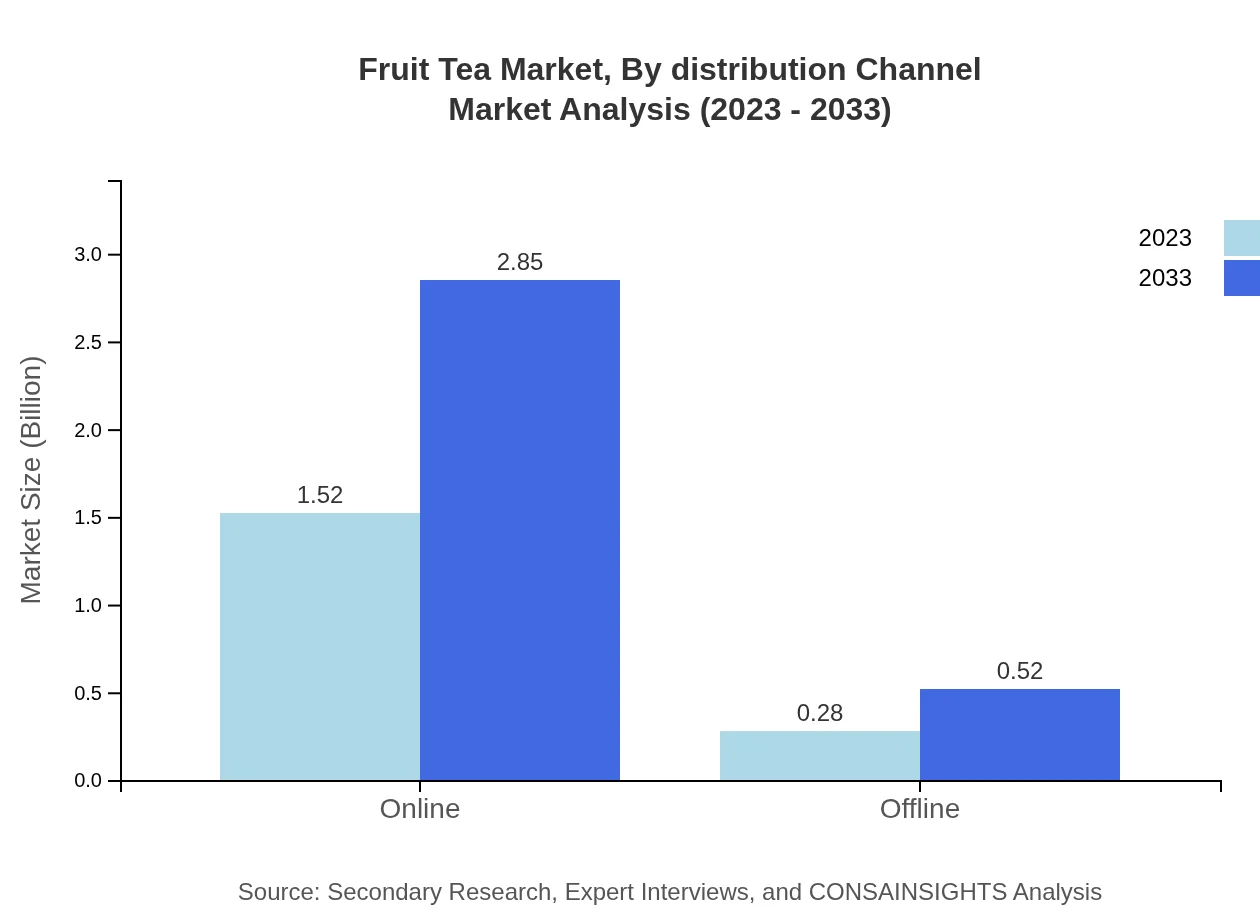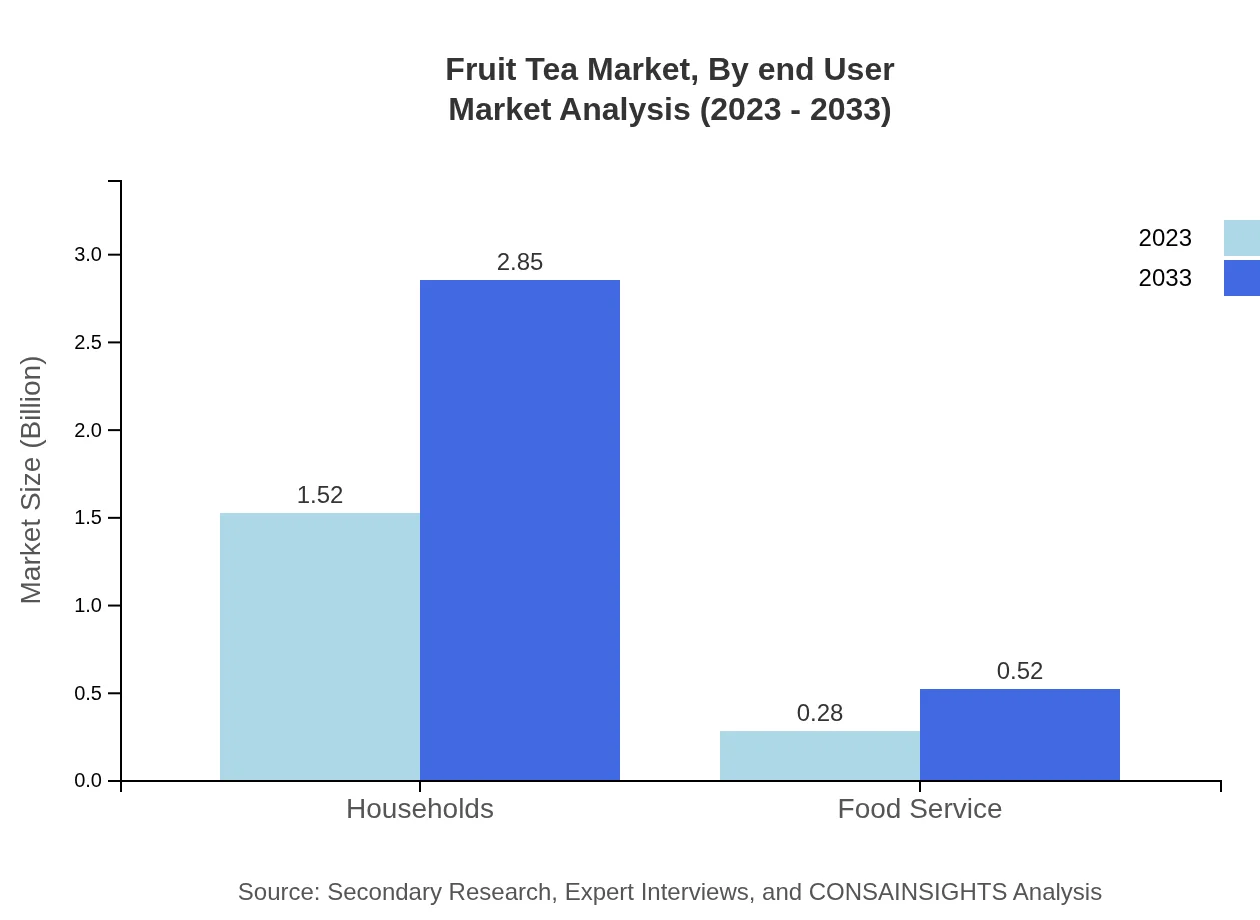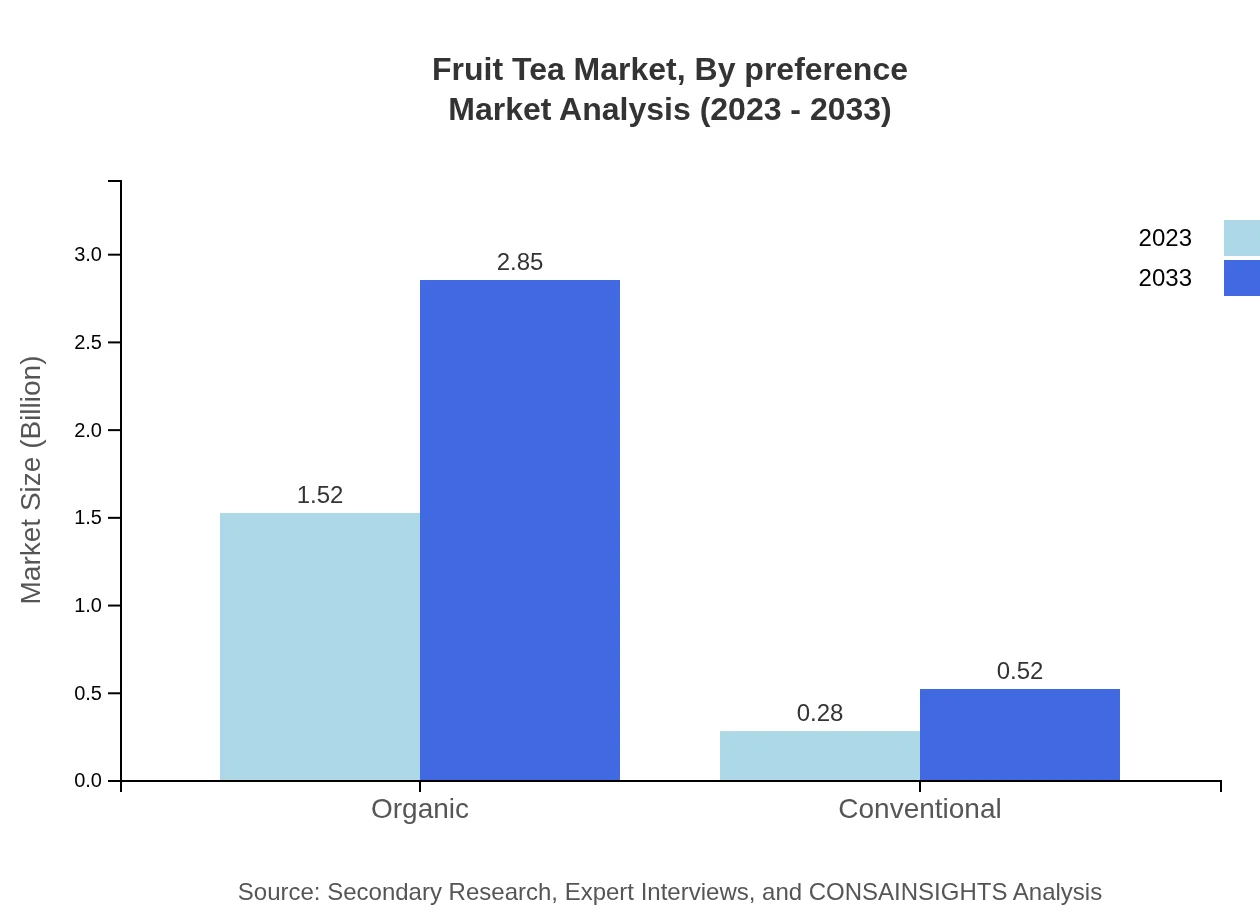Fruit Tea Market Report
Published Date: 31 January 2026 | Report Code: fruit-tea
Fruit Tea Market Size, Share, Industry Trends and Forecast to 2033
This comprehensive report provides an in-depth analysis of the fruit tea market from 2023 to 2033, showcasing market trends, size, growth rates, and key segments. Insights include regional analysis, industry challenges, and future forecasts to help stakeholders make informed decisions.
| Metric | Value |
|---|---|
| Study Period | 2023 - 2033 |
| 2023 Market Size | $1.80 Billion |
| CAGR (2023-2033) | 6.3% |
| 2033 Market Size | $3.37 Billion |
| Top Companies | Twinings, Lipton, Tetley, Harney & Sons, Stash Tea |
| Last Modified Date | 31 January 2026 |
Fruit Tea Market Overview
Customize Fruit Tea Market Report market research report
- ✔ Get in-depth analysis of Fruit Tea market size, growth, and forecasts.
- ✔ Understand Fruit Tea's regional dynamics and industry-specific trends.
- ✔ Identify potential applications, end-user demand, and growth segments in Fruit Tea
What is the Market Size & CAGR of the Fruit Tea market in 2023 and 2033?
Fruit Tea Industry Analysis
Fruit Tea Market Segmentation and Scope
Tell us your focus area and get a customized research report.
Fruit Tea Market Analysis Report by Region
Europe Fruit Tea Market Report:
The European market, initially valued at $0.62 billion, is projected to grow to $1.17 billion by 2033. European consumers are increasingly opting for organic fruit teas and herbal blends, fostering demand across specialty tea shops and supermarkets. Trends towards sustainability and health also significantly impact buying behavior.Asia Pacific Fruit Tea Market Report:
In the Asia Pacific region, the fruit tea market was valued at $0.31 billion in 2023 and is expected to grow to $0.58 billion by 2033. The increasing popularity of herbal and fruit blends, coupled with expanding retail chains and supermarkets, is driving growth. Health-conscious consumers in countries like China and Japan are trending towards fruit teas for their health benefits.North America Fruit Tea Market Report:
North America, which had a market value of $0.62 billion in 2023, is forecasted to reach $1.16 billion by 2033. The rising popularity of fruit teas among millennials and increasing retail options are propelling growth in this market. Innovative flavors and blends are crucial in appealing to diverse consumer preferences.South America Fruit Tea Market Report:
The South American market, currently valued at $0.17 billion, is projected to reach $0.33 billion by 2033. The demand for herbal infusions and fruit teas is gaining momentum, especially in Brazil and Argentina, due to an increasing trend towards wellness and natural products.Middle East & Africa Fruit Tea Market Report:
In the Middle East and Africa, the market currently stands at $0.07 billion and is expected to grow to $0.13 billion by 2033. The popularity of wellness teas and the combination of fruit and traditional tea flavors cater to local palates, aiding market expansion.Tell us your focus area and get a customized research report.
Fruit Tea Market Analysis By Fruit Type
The fruit tea market by fruit type is led by citrus fruits, which accounted for a size of $1.09 billion in 2023 and is expected to reach $2.03 billion by 2033, holding a market share of 60.41%. Berries rank second with a market size of $0.37 billion, projected to grow to $0.69 billion, capturing 20.48% share. Stone fruits follow, representing a size of $0.34 billion, anticipated to rise to $0.64 billion, with a share of 19.11%.
Fruit Tea Market Analysis By Product Type
In terms of product type, loose leaf tea remains dominant, valued at $1.09 billion in 2023 and projected to grow to $2.03 billion by 2033, capturing 60.41% of the market. This is followed by tea bags at $0.37 billion, likely to reach $0.69 billion, securing 20.48% share. Ready-to-drink fruit tea, worth $0.34 billion in 2023, is estimated to grow to $0.64 billion, holding a 19.11% share.
Fruit Tea Market Analysis By Distribution Channel
The distribution analysis reveals that online channels dominate with a size of $1.52 billion in 2023 translating to an 84.61% market share. Offline channels account for $0.28 billion, with a 15.39% share. The trend towards e-commerce is expected to continue as consumers prioritize convenience and availability in their tea purchasing options.
Fruit Tea Market Analysis By End User
The fruit tea market is primarily driven by households, which represented a market size of $1.52 billion in 2023, projected to grow to $2.85 billion by 2033, maintaining an 84.61% market share. Food service providers account for $0.28 billion in 2023, expected to increase to $0.52 billion, retaining a 15.39% share as cafes and restaurants innovate their drink offerings.
Fruit Tea Market Analysis By Preference
The increasing trend towards organic products is evident, with organic fruit teas valued at $1.52 billion in 2023 and projected to reach $2.85 billion by 2033, securing an 84.61% market share. Conventional fruit teas, currently at $0.28 billion, are expected to grow to $0.52 billion, making up 15.39% of the market as consumers are drawn to the health benefits offered by organic certifications.
Fruit Tea Market Trends and Future Forecast
Tell us your focus area and get a customized research report.
Global Market Leaders and Top Companies in Fruit Tea Industry
Twinings:
A renowned name in the tea market, Twinings offers a wide range of fruit tea blends that are popular for their rich flavors and premium quality, appealing to both casual drinkers and connoisseurs.Lipton:
Lipton is a global beverage brand known for its extensive range of tea products, including a variety of fruit teas that resonate with health-oriented consumers and offer refreshing flavors.Tetley:
Tetley focuses on innovation and sustainability, producing a diverse selection of fruit teas aimed at health-conscious consumers looking for both enjoyment and benefits.Harney & Sons:
This premium tea brand specializes in unique blends of fruit teas, ensuring high-quality ingredients and a luxury tea experience for discerning customers.Stash Tea:
Stash Tea is recognized for its creatively blended fruit teas, attracting customers with its variety of options and commitment to natural ingredients.We're grateful to work with incredible clients.









FAQs
What is the market size of fruit Tea?
The fruit tea market is projected to reach $1.8 billion by 2033, growing at a CAGR of 6.3%. This growth reflects increasing consumer interest in healthy beverage options, particularly among households and food service sectors.
What are the key market players or companies in the fruit Tea industry?
Key players in the fruit tea market include established beverage companies and specialty tea retailers that leverage innovative blends. These companies focus on product quality and unique flavor offerings to capture the growing health-conscious consumer base.
What are the primary factors driving the growth in the fruit tea industry?
The growth of the fruit tea industry is driven by heightened consumer awareness of health benefits, an increase in the popularity of natural ingredients, and a shift towards wellness-focused beverages among young and health-conscious consumers.
Which region is the fastest Growing in the fruit tea market?
The fastest-growing region in the fruit tea market is Europe, projected to expand from $0.62 billion in 2023 to $1.17 billion by 2033. Followed closely by North America, which is projected to grow from $0.62 billion to $1.16 billion.
Does ConsaInsights provide customized market report data for the fruit tea industry?
Yes, ConsaInsights offers customized market reports tailored to specific needs within the fruit tea industry, providing targeted insights and data for your business strategy and market analysis.
What deliverables can I expect from this fruit tea market research project?
Expect comprehensive market insights including detailed segment analyses, competitive landscape overview, market forecasts, and actionable recommendations tailored to the fruit tea market to guide business decisions.
What are the market trends of fruit tea?
Current market trends in the fruit tea sector include a surge in organic offerings, the rise of online sales platforms, and an increasing demand for health-oriented beverages that emphasize natural ingredients.

